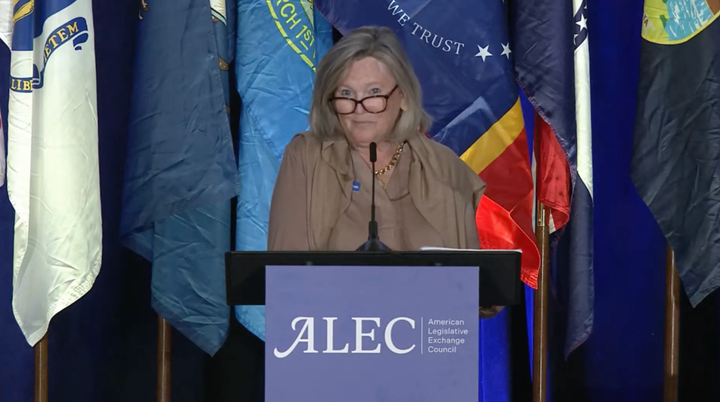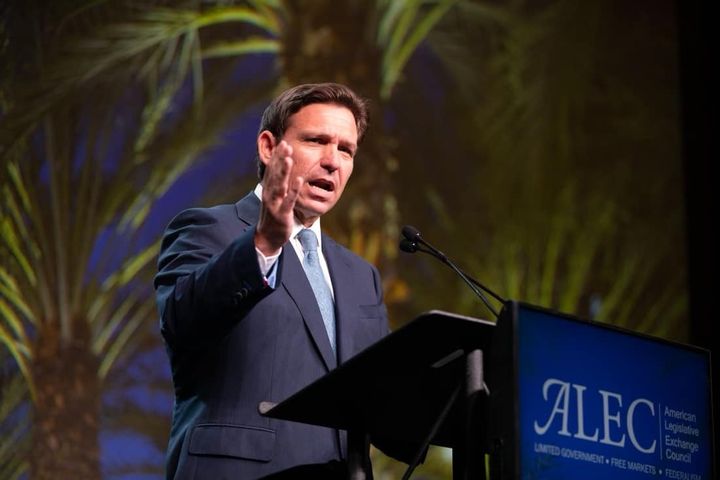Last December, an innocuously named nonprofit, the Foundation for Government Accountability (FGA), wined and dined Republican politicians and White House staffers at a Walt Disney World resort, according to a new report from the Center for Public Integrity. The pitch: make it harder for poor Americans to access government programs meant to help them get on secure financial ground, especially the Supplemental Nutrition Assistance Program (SNAP), commonly known as food stamps, and Medicaid.
The group has already achieved some victories, as states including Kansas, Kentucky, Mississippi, and West Virginia have imposed work requirements on SNAP recipients, sometimes using FGA model legislation. A nationwide version of work requirements proposed by the Trump administration is expected to kick hundreds of thousands of poor Americans off of SNAP.
A Sludge investigation has found that FGA is heavily financed by a powerful Wisconsin foundation birthed by the wealthy, conservative Bradley brothers, multiple nonprofits affiliated with rightwing billionaire industrialist Charles Koch, and two dark money vehicles funded by Koch and Bradley charitable nonprofits. A number of FGA executives and board members work or have worked for other connected Bradley- and Koch-funded think tanks and political groups.

FGA and its connected lobbying arm, the Opportunity Solutions Project, are employing a common tactic among conservative economists, policy writers, and free-market ideologues, recasting cuts to public welfare benefits as encouraging “the redeeming power of work.”
This PR approach to welfare cuts comes out of the playbook of some of FGA’s funders, including the libertarian Koch, CEO of manufacturing conglomerate Koch Industries and one of the richest men in the world. The Koch political and academic networks have adopted the phrases “human flourishing” and “well-being” to characterize harsh cuts to public assistance that many poor people depend on. Regardless of the Koch network’s claims, these kinds of welfare cuts mean more money that the billionaire class gets to keep from the Internal Revenue Service.
FGA represents one of many investments that wealthy American conservatives have made in order to weaken the American majority—working class Americans—and institutions meant to benefit them in favor of the private property ownership of a small but powerful minority.
The Lynde and Harry Bradley Foundation has donated nearly $2.3 million to FGA since 2013, according to its annual reports. Based in Wisconsin and named after two brothers, Lynde and Harry, whose factory automation business made them a fortune, the foundation is led in part by its president, Art Pope, a wealthy North Carolinian political donor and close Koch ally. On its board are current and former business executives including GOP megadonor Diane Hendricks, owner of building company ABC Supply. The Bradley Foundation was established in 1942, the year that Lynde Bradley died, and funded schools, hospitals, and other local initiatives in its early days. Harry Bradley, who was a “fierce anti-Communist” and supported the far-right John Birch Society, died in 1965. Twenty years later, the family business was sold to Rockwell International for nearly $1.7 billion, and with a huge influx of cash, the Bradley Foundation massively expanded its work to promote the conservative values of its namesakes.
The foundation is deeply committed to state political efforts around the country, and hacked records show the extent of its powerful political operation. The foundation finances think tanks, bill-writing groups, legal centers, and conservative media in states such as Colorado, North Carolina, Washington, and Wisconsin to promote stricter welfare work requirements, anti-union policies, school privatization, and climate change skepticism.

Its 2013 donation of $25,000 went towards FGA’s general operations, according to tax documents reviewed by Sludge. Then, in 2014, the Bradley Foundation donated $200,000 for “public education about Medicaid.” The following year, it upped its annual contribution to $350,000, and in 2016 it funded FGA’s “welfare and work” project. In 2017, it began funding FGA’s Restore the Working Class initiative, “a project which created a set of 21 model reforms for states to reduce the welfare state and restore the working class.” Last year, the foundation increased its donation to $500,000, which financed “reducing the welfare state and restoring the working class,” as did another half million dollars in 2019.

Koch’s foundations haven’t give much to FGA directly. In 2017, the Charles Koch Foundation gave $3,300 to the group, and the Freedom Partners Institute, an affiliate of the central funding operation of Koch’s political network, donated $30,000 in 2016. FGA has been a host organization for Charles G. Koch summer fellows. But dark money groups that Koch heavily funds via his foundations are FGA’s biggest benefactors. Donors Trust, a nonprofit popular with far-right millionaire and billionaire donors, gave over $2.8 million to FGA from 2015 to 2017. Its affiliate, Donors Capital Fund, gave FGA more than $2.3 million from 2015 to 2016. Both organizations are donor-advised fund sponsors, meaning they manage the money of individual donors who tell them where to contribute the funds, masking the donors’ names from the recipient organizations’ public records. (Donors Trust and Donors Capital Fund will be referred to as “the Donors groups” in this article.)
[Read all of Sludge’s Koch coverage]
Several FGA executives and board members are closely linked to a host of conservative nonprofit political networks and think tanks that are also funded by the Koch and Bradley family foundations. This tight network of funders and nonprofits is an example of just one carefully organized wing of the Koch-backed political and educational network.

Tarren Bragden, CEO of FGA, was previously CEO of Donors Trust- and Donors Capital Fund-supported Maine Heritage Policy Center, which is a member of the State Policy Network (SPN), a web of conservative, state-based think tanks funded by the Koch and Bradley foundations. FGA is an SPN member, and SPN has donated to FGA.
SPN is an associate member of another umbrella group of conservative organizations, the Atlas Network, which has donated to network partner FGA. Atlas has promoted Bragden’s praise of Kansas’ SNAP work requirements.
Kristina Rasmussen, the top lobbyist at FGA’s Opportunity Solutions Project, was previously executive vice president of the Illinois Policy Institute, a think tank and SPN member that has received funding from the Atlas Network, the Bradley Foundation, the Charles Koch Institute, and the Donors groups. The Institute’s former director of health policy and pension reform, Jonathan Ingram, is now FGA’s vice president of policy and research.
FGA chief operating officer and general counsel Jonathan Bechtle was previously CEO of the Freedom Foundation, a nonprofit funded by the Charles Koch Foundation and Donors Capital Fund. The Freedom Foundation is an Atlas Network partner, an SPN affiliate, and a member of the American Legislative Exchange Council (ALEC), a corporate bill mill that produces conservative model legislation for state legislators and is funded in part by two Koch Foundations, the Bradley Foundation, and Donors Capital Fund. Koch Industries is a corporate board member of ALEC. ALEC promotes state bills to block Medicaid expansion and backs Medicaid work requirements.
FGA board member Robert Levy is chairman of the Cato Institute, a libertarian think tank co-founded by Koch and funded by multiple Bradley, Koch, and the Donors groups, as well as by the Atlas Network. Levy is also a board member of George Mason University’s Antonin Scalia Law School, which received its current name as part of a $10 million donation from the Charles Koch Foundation, which accompanied $20 million from an anonymous donor.
Bridgett Wagner, another FGA board member, is the Heritage Foundation’s vice president of policy promotion and a board member at SPN. Heritage is funded by the Bradley, Koch, and the Donors groups and is an SPN member.
Use the interactive graphic to explore these numerous connections between FGA, its officers, and Bradley- and Koch-funded organizations.



